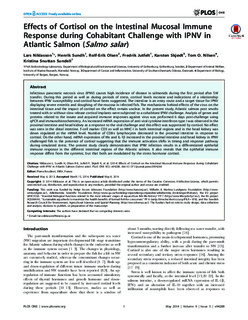| dc.contributor.author | Niklasson, Lars | |
| dc.contributor.author | Sundh, Henrik | |
| dc.contributor.author | Olsen, Rolf Erik | |
| dc.contributor.author | Jutfelt, Fredrik | |
| dc.contributor.author | Skjødt, Karsten | |
| dc.contributor.author | Nilsen, Tom O. | |
| dc.contributor.author | Sundell, Kristian Snuttan | |
| dc.date.accessioned | 2015-01-29T15:57:59Z | |
| dc.date.available | 2015-01-29T15:57:59Z | |
| dc.date.issued | 2014-05-08 | |
| dc.identifier.citation | Niklasson L, Sundh H, Olsen R-E, Jutfelt F, Skjødt K, et al. (2014) Effects of Cortisol on the Intestinal Mucosal Immune Response during Cohabitant Challenge with IPNV in Atlantic Salmon (Salmo salar). PLoS ONE 9(5): e94288. doi:10.1371/journal.pone.0094288 | nb_NO |
| dc.identifier.issn | 1932-6203 | |
| dc.identifier.uri | http://hdl.handle.net/11250/275074 | |
| dc.description.abstract | Infectious pancreatic necrosis virus (IPNV) causes high incidence of disease in salmonids during the first period after SW transfer. During this period as well as during periods of stress, cortisol levels increase and indications of a relationship between IPNV susceptibility and cortisol have been suggested. The intestine is an entry route and a target tissue for IPNV displaying severe enteritis and sloughing of the mucosa in infected fish. The mechanisms behind effects of the virus on the intestinal tissue and the impact of cortisol on the effect remain unclear. In the present study, Atlantic salmon post smolts treated with or without slow release cortisol implants were subjected to a cohabitant IPNV challenge. Analysis of genes and proteins related to the innate and acquired immune responses against virus was performed 6 days post-challenge using qPCR and immunohistochemistry. An increased mRNA expression of anti-viral cytokine interferon type I was observed in the proximal intestine and head kidney as a response to the viral challenge and this effect was suppressed by cortisol. No effect was seen in the distal intestine. T-cell marker CD3 as well as MHC-I in both intestinal regions and in the head kidney was down regulated at the mRNA level. Number of CD8α lymphocytes decreased in the proximal intestine in response to cortisol. On the other hand, mRNA expression of Mx and IL-1β increased in the proximal intestine and head kidney in IPNV challenged fish in the presence of cortisol suggesting that the immune activation shifts in timing and response pathway during simulated stress. The present study clearly demonstrates that IPNV infection results in a differentiated epithelial immune response in the different intestinal regions of the Atlantic salmon. It also reveals that the epithelial immune response differs from the systemic, but that both are modulated by the stress hormone cortisol. | nb_NO |
| dc.language.iso | eng | nb_NO |
| dc.publisher | Public Library of Science | nb_NO |
| dc.rights | Navngivelse 3.0 Norge | * |
| dc.rights.uri | http://creativecommons.org/licenses/by/3.0/no/ | * |
| dc.title | Effects of Cortisol on the Intestinal Mucosal Immune Response during Cohabitant Challenge with IPNV in Atlantic Salmon (Salmo salar) | nb_NO |
| dc.type | Journal article | nb_NO |
| dc.type | Peer reviewed | nb_NO |
| dc.subject.nsi | VDP::Agriculture and fishery disciplines: 900::Fisheries science: 920::Fish health: 923 | nb_NO |
| dc.source.pagenumber | 12 p. | nb_NO |
| dc.source.volume | 9 | nb_NO |
| dc.source.journal | PLoS ONE | nb_NO |
| dc.source.issue | 5 | nb_NO |
| dc.identifier.doi | 10.1371/journal.pone.0094288 | |

